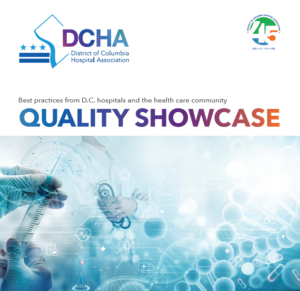Permaneça conectado
Inscreva-se para Comunicações Semanais do DCHA News

MAPA DO SITE
LOCALIZAÇÃO
Rua 15, 1152
Suíte 900
Washington DC
20005
The District of Columbia Hospital Association, at its December 14 Board of Directors Annual Meeting, voted to elect a new slate of Board officers for terms beginning in January 2024. DCHA is the unifying voice advancing hospitals and health systems in the District of Columbia by promoting policies and initiatives that strengthen our system of care, preserve access, eliminate disparities, and promote better health outcomes for patients and communities. The 2024 Board Officers are:
Dr. Gregory Argyros, Board Chair
President, MedStar Washington Hospital Center
Senior Vice President, MedStar Health
Dr. Hasan Zia, Immediate Past Chair
Presidente e Diretor de Operações, Hospital Sibley Memorial
Kimberly Russo, Vice Chair
Chief Executive Officer, The George Washington University Hospital
Anita Jenkins, Secretary
Diretor Executivo, Howard University Hospital
Ryan Zumalt, Treasurer
Chief Executive Officer, BridgePoint Healthcare – Capitol Hill
In modern health care, hospitals stand as beacons of healing, embodying the convergence of medical science and human empathy. These centers of health are not just facilities; they symbolize a commitment to providing equitable care to all. Yet, beneath the surface of this noble endeavor, disparities persist, reflecting broader societal challenges. Health equity in hospitals goes beyond policy; it represents a moral imperative to ensure that every individual receives the care they need regardless of background or economic status. This complex and ever-evolving pursuit is at the heart of transforming healthcare into a truly inclusive system.
The persistence of inequity within the walls of hospitals is a complex issue with multifaceted roots. Several key factors contribute to the existence of inequity in health care settings.
Medicare supports health equity through its comprehensive coverage, which includes hospitalization, outpatient medical services, and prescription drugs. This coverage helps reduce the disparities in health care access and outcomes for the elderly and disabled populations. Moreover, Medicare’s preventive care services and chronic disease management programs are instrumental in mitigating health inequities, as these initiatives are designed to provide early detection and consistent management of health conditions that disproportionately affect underserved populations.
Despite its significant role, Medicare faces challenges in fully addressing health equity. Issues such as coverage gaps, high out-of-pocket costs for certain services, and limitations in long-term care coverage can still leave some beneficiaries vulnerable. Additionally, disparities in health care access and quality persist among different groups within the Medicare population, influenced by factors such as race, ethnicity, and socioeconomic status.
One aspect of Medicare that impacts health equity is its portability, especially when beneficiaries move to another state. Understanding how to transfer Medicare to another state is crucial for maintaining continuity of care. While Medicare coverage is generally nationwide, there are nuances, particularly with Medicare Advantage plans and Part D prescription drug plans, which may have specific service areas or networks.
Beneficiaries must be aware of these details to ensure seamless access to health care services when relocating, thus contributing to the overall goal of health equity in the Medicare program.
This section delves into the strategies hospitals are adopting to advance health equity, ensuring that every individual receives equitable care.
The challenges are evident in the journey toward health equity, but so is the unwavering commitment to change. Health equity is not an abstract goal. It’s a fundamental right. Hospitals, as beacons of hope, are pivotal in this pursuit. Policies, practices, and innovation are shaping a healthcare landscape where every individual receives the care they deserve. This journey is not finite; it’s a continuous path toward a world where health disparities are a thing of the past.

Industry leaders are up against inflation, labor challenges, worsening mental health, rising costs and a slew of other challenges. The many women on the frontlines of health care’s transformation are leading the charge while making often less than their male counterparts and managing more of the work at home. However, these barriers aren’t holding back the leaders honored by Fierce Healthcare. Jacqueline D. Bowens, President & CEO of DCHA, is featured, along with nine other national leaders, whom are playing a major role in driving the industry forward.
In a 2019 study by the Department of Population Health at the New York University’s School of Medicine, Washington, D.C. ranked second among the 500 largest U.S. cities for highest life expectancy gaps between racially and ethnically segregated neighborhoods.
Residents of the nation’s capital face a life expectancy gap of 27.5 years between the city’s most affluent neighborhoods and its most underserved communities, which house a large percentage of the city’s Black residents.
“[It’s an] unacceptable reality in one of the most powerful cities in the world,” says Michael Crawford, MBA, MHL, associate dean for strategy, outreach, and innovation at Howard University College of Medicine, affiliated with association member Howard University Hospital, in Washington, D.C., and founder and executive director of Howard University’s 1867 Health Innovations Project.
Having worked in health care for more than two decades, Crawford has long been familiar with the intersections of public health, finance, strategy, policy, innovation, and strategic partnerships in the space. In his previous role of chief of staff at Unity Healthcare, Crawford took an interest in the unique role digital health technology could play to eradicate gaps in care and offer patients within medically underserved communities greater medical autonomy.
DCHA Presented Chairman Vincent C. Gray with Inaugural Health Equity Award
DCHA proudly commemorated our 45th Anniversary on November 16, with a grand celebration at the Ronald Reagan Building & International Trade Center. This significant milestone provided an opportunity for DCHA to recognize and honor an individual whose unwavering dedication has significantly impacted the health care landscape in the District of Columbia.
The DCHA Board of Directors announced The Honorable Vincent C. Gray as the inaugural recipient of the DCHA Health Equity Award. This esteemed accolade was presented to Chairman Gray in recognition of his decades-long, dedicated service to the District of Columbia and his steadfast commitment to ensuring that all residents have equal access to high-quality health care services.
“This much deserved recognition is in honor of his decades of service to the District and his perseverance in ensuring that all residents have access to quality health care. Councilmember Gray has a history of dedication to eradicating health disparities and was an instrumental force in making the Cedar Hill Regional Medical Center a reality,” said DCHA Board Chairman and President of Sibley Memorial Hospital Dr. Hasan Zia.
DCHA extends its heartfelt congratulations to The Honorable Vincent C. Gray and expresses its deep appreciation for his outstanding contributions to the health care community. This momentous occasion reaffirms DCHA’s commitment to working collaboratively to build a health care system that truly serves all residents.
“We are thrilled to honor and recognize individuals who tirelessly champion the rights and well-being of patients and families,” remarked DCHA President & CEO Jacqueline D. Bowens. “In honor of his exceptional contributions, we are excited to announce that this award will be known as the Vincent C. Gray Health Equity Award, reflecting Chairman Gray’s enduring legacy and commitment to the cause of health equity.
The Vincent C. Gray Heath Equity Award will honor and recognize individuals who are making health equity a reality in their community and leveraging engagement to improve health outcomes for those most impacted by health disparities. The award will go to an individual or organization that can demonstrate they have contributed to reducing disparities in health care quality.
DCHA Presented Doreen Gentzler with Haynes Rice Community Service Award
DCHA presented its Haynes Rice Community Service Award to Doreen Gentzler, former anchor with NBC4 at its 45th Anniversary Gala on November 16 at the Ronald Reagan Building & International Trade Center. This prestigious award acknowledges Doreen’s exceptional commitment and meritorious service in enhancing the health and well-being of the community served by DCHA members. It is a testament to her unwavering personal integrity and outstanding professional skills in problem-solving and surmounting obstacles to foster cooperative actions.
“Doreen has been a dedicated advocate for the DC community for over four decades, championing the cause of health care in both the hospital and health care sectors,” said DCHA President & CEO Jacqueline D. Bowens. “Her unwavering commitment to the DC Health & Fitness Expo and her role as a trusted source of health information for the greater Washington metropolitan area have left an indelible mark. She has tirelessly advocated for the betterment of both physical and mental health in the region.”
DCHA extends its congratulations to Doreen Gentzler and looks forward to continuing to work together and delivering outstanding efforts and leadership to our DC community.
Gentzler, a native of Arlington, Virginia, returned home to the Washington area in 1989 to join Jim Vance, Bob Ryan and George Michael on the WRC anchor desk. On her first newscast, Gentzler’s longtime co-anchor and close friend Jim Vance welcomed her by saying, “This is Doreen, folks. Doreen Gentzler. She’s going to be with us for quite a while.” Thirty-three years later, it’s safe to say Vance was right.
Gentzler played a key role in the station’s ratings success, anchoring News4 at 6 and News4 at 11 through her entire tenure and reporting throughout the world, including in Bosnia and Ecuador and aboard the USNS Comfort hospital ship. But she’s best known for her reporting in the D.C. area, where she has served as the station’s medical reporter for more than 30 years. Her clear, intelligent approach to telling these stories has provided important information, which some have called lifesaving.
DCHA Presented Dr. Kurt Newman with Robert Sloan Leadership Award
DCHA is thrilled to announce that the esteemed Robert Sloan Leadership Award was given to Dr. Kurt Newman, former President & CEO of Children’s National. This distinguished award recognizes his outstanding years of service and exemplary leadership qualities that have left an enduring mark on the health care community in the District of Columbia and beyond.
“We owe a wealth of gratitude for the sacrifices from individuals like Dr. Newman. Their efforts help us prepare for a better health care system for the residents of DC,” said DCHA President & CEO Jacqueline D. Bowens. “Dr. Newman’s outstanding contribution and commitment to fostering successful relationships in the DC health care community has left a positive impact.”
DCHA extends its congratulations to Dr. Kurt Newman and looks forward to continuing to work as a unifying force to bring better outcomes in the health care system.
Dr. Newman joined Children’s National as a surgical fellow in 1984 and became surgeon-in-chief and senior vice president for the Joseph E. Robert, Jr., Center for Surgical Care in 2003. He was instrumental in developing the vision for the Sheikh Zayed Institute for Pediatric Surgical Innovation at Children’s National, inspired by the bold vision of making surgery for children minimally invasive and pain-free. When the institute was created in 2009 through a transformational $150 million gift, Dr. Newman served as founding vice president. Last year, Dr. Newman received the CEO of the Year award from the Washington Business Journal.
Under Dr. Newman’s leadership, Children’s National was ranked No. 5 nationally in the U.S. News & World Report 2022-23 Best Children’s Hospitals annual rankings, which marked the sixth straight year Children’s National made the Honor Roll list, which ranks the top 10 children’s hospitals nationwide. In addition, its neonatology program, which provides newborn intensive care, ranked No.1 among all children’s hospitals for the sixth year in a row.

Patient Safety & Quality Poster Competition Winners
The District of Columbia Hospital Association awarded its 2023 Patient Safety & Quality Awards for its poster competition at its Patient Safety & Quality Summit on November 14.
“Congratulations to the poster competition winners. Their expertise and tireless efforts are instrumental in paving the way for an improved health care system to better serve patients and provide quality patient care,” said DCHA President & CEO Jacqueline D. Bowens.
The Gold Winner was awarded a $3,000 prize, the Silver Winners received $2,000, and the Bronze Winners received $1,000. The award winners were chosen by a panel of independent judges from the health care industry. Congratulations to all winners.
Patient Safety & Quality Individual Award Winners
DCHA awarded its 2023 Patient Safety & Quality Awards for a non-clinical and clinical individual who exhibit excellence in their field, strengthening their hospital’s mission and goals. Award winners also manage change in an environment of competing priorities, and support resiliency and engagement from patients, caregivers, and the care team. The awards were presented during DCHA’s 45th Anniversary Gala Celebration on November 16.
Paul Quigley, Executive Director of Security, Parking & Transportation at Children’s National won the award in the non-clinical category.
Paul has implemented several initiatives to improve the safety for the patients, families, and staff at Children’s National Hospital. He’s instituted comprehensive training programs and processes including active shooter training, de-escalation techniques, electronic security screening, and security townhall meetings. Paul is a person that brings knowledge and experience and communicates his passion for safety and security in a way that makes you feel comfortable, not fearful. Even though he’s a leader, he will routinely be on the frontlines making rounds to ensure he’s meeting the safety expectations of staff, patients, and families.
Rosie Dunkle, Critical Care Clinical Specialist at MedStar Washington Hospital Center won the award in the clinical category.
Rosie’s leadership on the Catheter-Associated Urinary Tract Infections (CAUTI) Prevention Committee at MedStar Washington Hospital Center has led to a diagnostic stewardship protocol, nurse champion empowerment program, interdisciplinary CAUTI event reviews, and meaningful improvements to the pathology, provider, and nursing Electronic Medical Record resulting in a sustained CAUTI Standard Infection Ratio far exceeding system expectations. Rosie is an exceptional nurse who consistently exemplifies the highest level of safe, quality patient care for the most vulnerable patients. Rosie’s open communication skills enable her to be a great team player who demonstrates a caring and compassionate attitude towards her patients, co-workers, and family members.
“Congratulations to our winners – Paul & Rosie! Your dedication to creating a safe patient care environment is a true embodiment of what hospitals stand for,” said DCHA President & CEO Jacqueline D. Bowens.
Distinguished Service Award
DCHA presented its Distinguished Service Award to Dr. Sharon Lewis, former interim director of DC Health. The Distinguished Service Award is presented to individuals who demonstrate exceptional leadership, exemplary professional skills, and noteworthy achievements in the health care sector. Dr. Sharon Lewis stands as a shining example of a dedicated professional who devoted 36 years of her career to serving the DC Health hospital and health care community. Dr. Lewis excels in fostering collaboration between private, public, federal, and municipal stakeholders, driving innovation in health care management, and spearheading advancements in health care careers.
“The Distinguished Service Award recognizes and celebrates Dr. Sharon Lewis’s extraordinary contributions to the health care sector. Her dedication and exceptional skills have left an indelible mark on the industry,” said DCHA President & CEO Jacqueline D. Bowens.
DCHA extends its congratulations to Dr. Lewis and looks forward to continuing the exceptional work together and delivering outstanding leadership to the DC community.

DC Hospitals are Leaders in Creating Quality Systems of Care
As the District of Columbia Hospital Association (DCHA) celebrates the milestone of 45 years acting as a unifying force advancing hospitals and health systems in the District, we are proud to share examples of our hospitals’ commitment to patient safety that drives positive outcomes. In collaboration with members and the community, we seek to promote policies and initiatives that strengthen our system of care, preserve access, eliminate disparities, and promote better health. We are proud to highlight the work of our hospital members to improve patient safety and quality in a time of competing priorities. The initiatives presented in this publication emphasize quality improvement methodology and highlight the innovative and effective projects taking place within District hospitals. These initiatives represent the dedication of our health leaders in the District to provide quality and equitable care for the communities we serve.